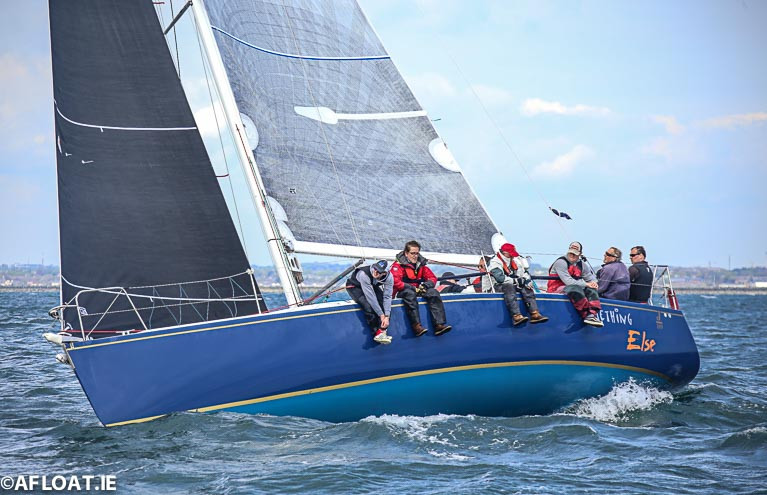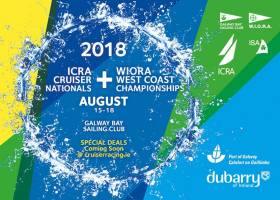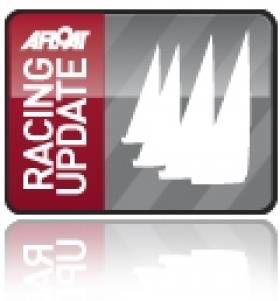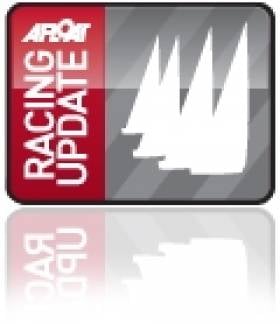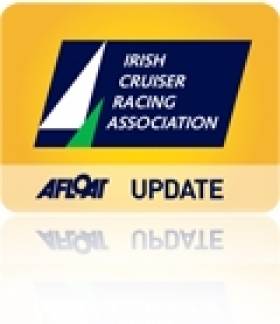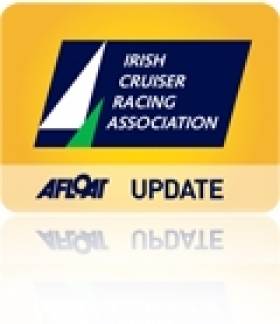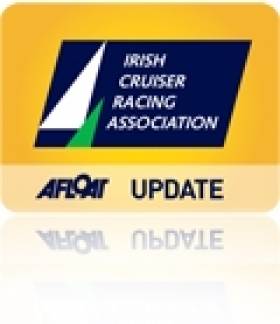Displaying items by tag: ICRA nationals
Class Bands Released for ICRA Nationals at Volvo Cork Week
The class bands and fleets are now finalised for the ICRA Nationals which take place as part of Volvo Cork Week this year.
With the fleet split across Classes 0,1,2,3 along with Non Spinnaker and Coastal, ICRA trophies and more will be up for grabs for the winners.
The Nationals, like the Round Ireland, are a Category 1 ICRA event and therefore carry a double weighting towards the ICRA Boat Of The Year gong.
The full lists of entries can be found on the Cork Week website, and the class bands are as follows:
- IRC 0 - 1.126 & above
- IRC 1 - 1.025 to 1.125
- IRC 2 - 0.935 to 1.024
- IRC 3 - less than 0.935
- Coastal - 0.950 & above
- Non Spinnaker 1 - 0.950 & above
- Non Spinnaker 2 - less than 0.949
- Beaufort Cup - All eligible yachts
- Classic Inshore - All eligible yachts
- Classics/Go To Cork - All eligible yachts
As previously reported on Afloat.ie, a number of feeder races will lead into this year’s ICRA Nationals, including the Falmouth to Cork Race from 7 July in which the Prince of Wales 300th Anniversary Trophy will be contested for the first time.
Rapid Repairs for Ker 37 Jump Juice to Make the ICRA Championships Start This Morning
It's been a busy 24 hours for Royal Cork Yacht Club Cruisers Zero favourite Jump Juice since arriving in Dun Laoghaire Harbour for this weekend's ICRA National Championships.
The 80-boat Championships starts this morning but hull damage discovered on the Ker 37 during a routine pre-race check has meant rapid repairs for Conor Phelan and his crew.
The situation is now reported to be very much under control and the former Irish IRC champion yacht and RORC Easter Challenge winner is on schedule to be on the line for this morning's first coastal race but only after the 'all-nighter' intervention of County Wicklow boatbuilder Graeme Noonan with his infrared lamp and mobile epoxy pack.
In Afloat's pre-championship prediction, the crew are expected to perform well in the 13-boat cruisers Zero fleet where the competition includes ISORA Champion Rockabill VI and Greystones Calves Week winner, the J122 Kaya.
 The hull damage
The hull damage
 Repair made and drying under infrared lamp
Repair made and drying under infrared lamp
 As good as new - Graeme Noonan applies the finishing touches to Jump at 0730 this morning...
As good as new - Graeme Noonan applies the finishing touches to Jump at 0730 this morning...
The Notice of Race and online entry form are now available for the Irish Cruiser Racing Association’s National Championships 2021 later this year.
As previously reported on Afloat.ie, the National Yacht Club in Dun Laoghaire is the host for this year’s event — scheduled for the weekend of Friday 3 to Sunday 5 September.
The three-day Championships being held in Dun Laoghaire will comprise fleets accommodating offshore, traditional and white sail racing.
Each fleet will get its own race areas with race management. Three fleets will be accommodated at the event covering:
- Fleet 0 Class 0
- Fleet 1 Class 1 and 2
- Fleet 2 Class 3 and Corinthians Cup White Sails classes
Fleet 0 will be provided with a combination of Coastal courses and Windward Leeward races, while Fleets 1 & 2 will have a mix of inshore races covering both Round the Cans and Windward Leeward courses.
 The Irish Cruiser Racing Association’s National Championships 2021 is on Dublin Bay this September
The Irish Cruiser Racing Association’s National Championships 2021 is on Dublin Bay this September
Courses will be managed by International PROs Jack Roy and Con Murphy from the NYC.
Back on shore, possibly for the first big Irish regatta of the year, the renowned National Yacht Club will welcome and provide full hospitality for all, subject to prevailing COVID 19 regulations.
Regatta Director, Paul Barrington commented, "The National Yacht Club is delighted to be hosting the ICRA National Championships and to welcome sailors from around the island of Ireland following a very difficult 18 months. Together with ICRA and a large team of National Yacht Club volunteers, we look forward to creating an environment for enjoyable and competitive racing for these prestigious Championships."
 The National Yacht Club in Dun Laoghaire is the host for this year’s event
The National Yacht Club in Dun Laoghaire is the host for this year’s event
ICRA Commodore, Richard Colwell added, "We are delighted to launch the ICRA National Championships 2021 in conjunction with the NYC and our sponsors. It is fantastic to be launching an event that looks very likely to go ahead, and now looks certain to be one of the biggest and most competitive events of the year. We will have great racing and fun for all cruiser racers at the Championships, from J24s to Sunfast 3300's, and both furling and non-furling white sails classes. We recommend completing your entry as soon possible to ensure your place."
Entries can be made on-line here before 20 August 2021
The Entry Fees are as follows:
Before 11th June
Boats rating 0.895 and under €165
Boats rating between 0.896 and 0.985 €195
Boats rating 0.986 and above €225
After 11th June
All Boats €245

2021 Irish Sailing Calendar Has Early Fixture Clashes
The wholesale cancellation of early 2020 regatta fixtures, is impacting the 2021 season with some conflicting dates appearing for May and June 2021.
So far, four key fixtures of Irish interest appear to be affected next season.
Firstly, Scotland's biggest sailing event, The Scottish Series at Troon, cancelled amid Covid-19 concerns last week, has published its usual UK Bank Holiday date of May 28-31 for 2021's edition. The Loch Fyne event is a traditional season opener in which Irish boats have dominated in recent years but 2021 may now lack Irish competition because this is also the date of the 2021 ICRA National Championships at the National Yacht Club at Dun Laoghaire on Dublin Bay.
A month later, Bangor Town Regatta on Belfast Lough, also cancelled last week, has been rescheduled for June 24-27, but this is the same long-standing date occupied by Kinsale Yacht Club's biennial Sovereign's Cup on the south coast.
So far, the rest of the 2021 season appears to be non-conflicting with the Dun Laoghaire Dingle 2021 Race on June 9 and Dun Laoghaire Regatta on July 8-11.
Attempts are usually made to avoid regatta date clashes because organisers typically like to attract visiting boats from outside a local catchment area for major events but when dates overlap this becomes impossible.
Galway Bay Confirmed As Hosts Of 2018 ICRA Nationals
#ICRA - The Irish Cruiser Racing Association has reaffirmed its decision to allocate the 2018 ICRA National Championships to the West of Ireland Offshore Racing Association (WIORA) and Galway Bay Sailing Club.
The event from 16-18 August 2018 will be run in conjunction with the 2018 WIORA West Coast Championships from 15-17 August.
This marks the Galway Bay Sailing Club’s first time hosting the ICRA Nationals, which were held at the Royal Cork this past summer, and members will be eager to show off their club’s revamped facilities in Galway Docks.
Reduced early entry fees with free cranage and berthage, accommodation packages, details of two prizegiving parties, the Notice of Race and entry form will be made available shortly, according to the GBYC.
#Joker2 - John Maybury's Joker 2 has had an impressive run of form since June, with big wins in both the ICRA Nationals/Sovereign's Cup week and more recently in the J/109 Nationals at the Dun Laoghaire Regatta.
The first of these victories for the Royal Irish YC boat came on Saturday 27 June in the hotly contested Class 1 at Kinsale, with Joker 2 squaring off against Ian Nagle's Jelly Baby – off the back of a win at the UK J/109 Nationals, and with Olympian Killian Collins on tactics, no less – and Pat Kelly's Storm from Rush.
In addition to the J109s, there were other very well-prepared boats such as Rockabill (Paul O'Higgins, with Mel Collins steering and Mark Pettitt calling tactics), Bon Exemple (with Ben Duncan calling the shots) and Fools Gold (Rob McConnell), which had just won the Scottish Series overall.
On the lighter first day, Jelly Baby, sporting a larger jib than the other J/109s, excelled with a first and a second, but Joker 2 kept in touch with a 1,3 scoreline. On the Archambault 35, Rob McConnell and crew found the lighter conditions less to their liking with a 7,2 scoreline, but they were to improve as the wind increased on later days.
Indeed, days 2 and 3 had much stronger conditions, with winds around 20 knots, and Joker 2 started to take control with a 2,1,4,1 scoreline. Fools Gold also showed strong with a score of 2,1,3,1 to keep them just just three points off the lead after discard, with Jelly Baby a further two points behind.
Roll on the final day at Kinsale, and Joker 2 took control of the first race to win by over a minute on corrected time, giving Maybury and crew (including Olympic sailor Mark Mansfield) the championship with a race to spare. Fools Gold would later take a win in the final race to end up second overall, with Jelly Baby taking third – meaning two J/109s placed in the top three.
Joker 2 and Storm would also dominate next big event for the J/109s, their Nationals as part of the Dun Laoghaire Regatta – racing as a separate class but with the same courses in most races as Class 1.
What's more, a glance at the finishing times would have had the J/109s winning most of the Div 1 races had they sailed as a single group.
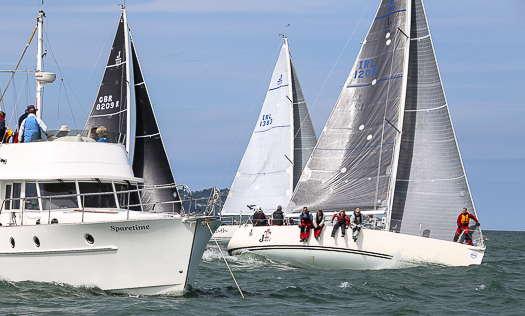
This race was abandoned at VDLR after a starting sequence error
After a faltering start on the Thursday (9 July), with racing abandoned after an early starting gun, the boats were flying in strong winds on day 2, held mainly in and around Howth.

Storm won both heavy air races on Day two of VDLR
Pat Kelly's Storm was the star of the show here, excelling in the conditions to win both races, though Joker 2 was a close second, with Something Else taking third overall.
Day 3 was sailed in 15 to 17 knots, and ended with a 1,2 scoreline for Joker 2 and a 1,4 for Storm, putting the latter ahead after discard by two points.
The next day would be the decider, and going in fleet was unsure whether the race committee would field a restart of Thursday's abandoned race as well as the final.
If there was just the one race, Joker 2 needed a win – and needed Storm no better than fourth place – to clinch the title. Two races would give Maybury a better opportunity to make up the deficit.
Sunday came and brought lighter winds. Joker 2 had the better of the start and tacked on Storm a number of times up the first beat, before breaking through to lead on the first downwind, with Storm yo-yoing between fifth and sixth.
However, that lead evaporated after the bottom mark when a left-degree shift with extra pressure brought Jigamaree, Something Else and Jalapeno into the top three, with Joker 2 now fourth.

Close racing in the J109s
It took until the very final mark for Maybury and company to overhaul that trio, taking the gun from Jalapeno by 30 seconds. With Storm coming in fifth and trailing by a point, with Joker 2 also having the better discard, the RIYC boat had done the necessary, provided no more racing was in order.
With the wind disappearing, race officer Jack Roy decided there was insufficient breeze to complete another race, and that was that: Joker 2 took the overall win and the J/109 National title for 2015 from Storm, with Jalapeno taking third on countback from Something Else due to her fine second place in the last race.
Continuing to grow in Dublin and elsewhere, J/109s have shown that they are not only a very well constructed and designed cruiser racer, they are also extremely competitive in IRC and have now won the last 2 IRC Nationals in Class 1.
J109 Irish Championships For Dun Laoghaire Not Kinsale
#j109 – Perhaps the fact J109s race for IRC handicap honours as part of the ICRA national championships and separately for the class national championship title may have contributed to wires getting crossed at last weekend's Sovereign's Cup and ICRA Nationals event in Kinsale.
Irish J109 fans are currently on a high with Royal Corks' Jelly Baby winning the UK National Championships and the National Yacht Club's Ruth winning offshore in the Dun Laoghaire to Dingle Race but after another good showing of the class last weekend (first and third for Js in ICRA Div one) there was confusion over the status of the Irish championship when Kinsale Yacht Club declared Joker II the winner of the J109 national championships. [See KYC press release HERE].
John Maybury's Joker II won the ICRA division one crown off Kinsale in fine style, but J109 class captain Martin Carey has been quick to point out the 2015 J109 National Championships – a season highlight – has not yet been sailed. The J109 Irish championships will be sailed next week as part of Dun Laoghaire Regatta. 'The Nationals are part of Volvo Dun Laoghaire, they always were going to be, as we get our own start,' Carey told Afloat.ie
#sovscup – UKMcWilliam Sailmakers are quick off the mark to celebrate weekend success at the Sovereign's Cup and ICRA Nationals. The Crosshaven–based sailmaker scooped 'two thirds of the class winners and two thirds of the class places' in the 109–boat fleet off Kinsale. As well as the sails on the overall winning yacht Equinox, UK McWilliam also took Division One ECHO, Division Two and Dvision three IRC. Sailmaker Des McWilliam has compiled a full list of winning boats setting UK McWilliam sails and it is downloadable below as a MS Word file.
#sovscup – No surprises that form boat Jelly Baby leads division one of the 2015 ICRA Nationals in Kinsale Yacht Club tonight writes Claire Bateman. No surprise either that another Irish UK champion this season is also in the frame after two light races on the south coast.
The annual (ICRA) championship that combines the club's Sovereigns' Cup event runs until Saturday. The event featured in today's Afloat enews. For more click here.
Forecasted moderate to fresh south–westerly winds gusting up to 25 mph that look set to provide perfect racing conditions for the 122–boat fleet failed to materialise this afternoon as did the summer sunshine.
Ian Nagle's Royal Cork leader – that has already chalked up two UK victories this season – is a single point ahead of J109 sistership Joker II (John Maybury) in the biggest fleet of the championship. Third, six points off the lead, is May's Scottish series winner Fool's Gold skippered by Rob McConnell of Waterford Harbour, Afloat's sailor of the month for May.
But despite the Munster lead in division in one, it is Howth Yacht Club that has set a strong early pace in the four-day series off the Old Head of Kinsale. The north Dublin club holds leading places in four of the eight racing divisions including the top four boats in Division 2.
Kinsale was like a deserted village when everybody had taken to the water. The day was dull and had what started out as a light breeze that filled in later in the day.
Former RCYC Admiral Peter Deasy reported from Class Three that it was very competitive and a very enjoyable day's racing.
Fleets were divided into red and green to alternate each day between windward/leeward and round the cans courses.
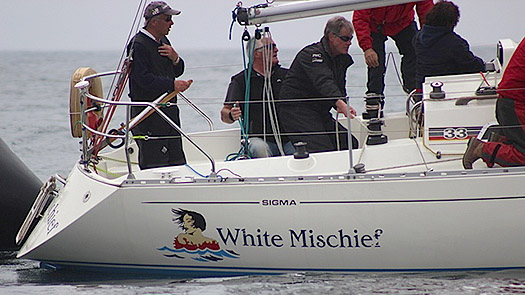
Champion Sigma 33 White Mischief skippered by Timothy Goodbody of the Royal Irish Yacht Club is fourth in class three
Class Three were to sail today on the round the cans course but due to the fickle breeze in the morning Race Officer Jack Roy set a windward/leeward course and shortened it to two rounds instead of three. As the wind filled in during the day a round the cans course was set and while the Desmond/Deasy Ivers Bad Company (RCYC) led all the way from the weather mark, she was caught at the finish by Richard Colwell's Corby 25 who had a two and a one in IRC with Bad Company on three and two in second and another Corby 25 , Paul Tingle's Alpaca (RCYC) also enjoying the lighter conditions lying third.
Meanwhile, in Alan Crosbie's red fleet sailing the windward/leeward course were Classes Zero, One and Two, and in the lighter airs of the morning ICRA Commodore, Norbert Reilly, sailing the Mills 36 Crazy Horse Zero took the first gun followed by regular visitor to Ireland Andy Williams of Yealm Yacht Club in his Ker 40 Keronimo, in second but these positions were reversed in Race Two so an interesting battle is already developing in this fleet. Currently lying third is the Jonathan Anderson Roxstar an XP381 followed by local RCYC boat Denise and Conor Phelan's Jump Juice.
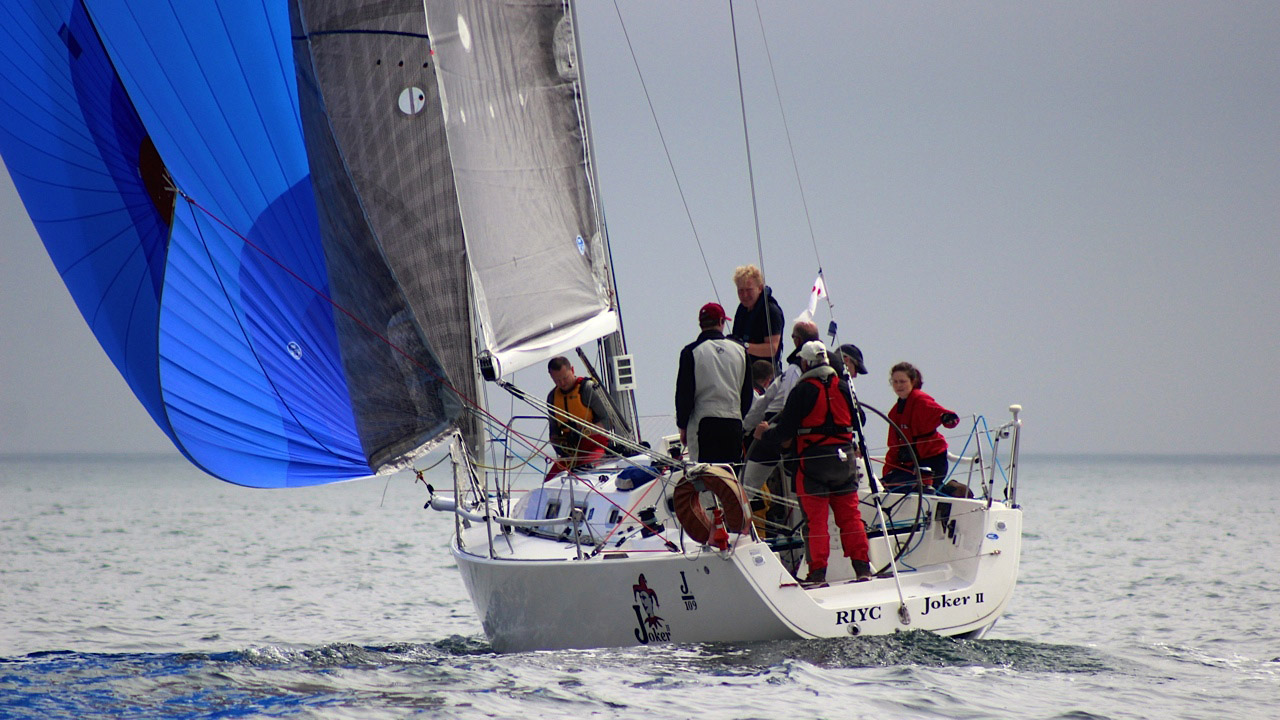
Dublin Bay's Joker II is second overall in IRC one
As previously mentioned, in Division One IRC, one of the hardest fought divisions the current two first places are occupied by RCYC Ian Nagle's J109 Jelly Baby, currently riding high on a succession of major wins, followed John Maybury's Joker 2 another J109 and a previous winner of this class Rob McConnell's Archambult 35 Fool's Gold in third place. Following in fourth place is Richad Fides Corby 33, with Paul O'Higgins Rocakbill V in fifth and Pat Kelly's J109 Storm in sixth place. A truly formidable line up and a good week of battle to look forward to.
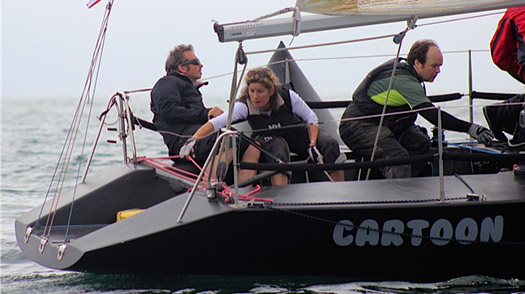
The Quarter Tonner Cartoon (Ken Lawless, Joe Brady, Sybil McCormack) second in class four
As reported today in Afloat.ie, the battle for the half tonners is in already in full swing. With the first four positions dominated by Howth Yacht Club led by David Cullen's Checkmate XV with two wins, with Harmony having to be content with two seconds. Lying third is the well travelled Equinox the X332 of Ross McDonald on equal points with another half tonner Michael and Richard Evans The Big Picture.
Tomorrow's winds are expected to be stronger so a great day's racing lies in store
Results ICRA Nationals & Sovereign's Cup 2015
Day 1, after 2 races sailed (24th June 2015)
Division 0 IRC
1 Keronimo, Andy Williams (Yealm Yacht Club)
2 Crazy Horse, Norbert Reilly/Alan Chambers (Howth Yacht Club)
3 Roxstar, Jonathan Anderson, (Clyde Cruising Club)
Division 0 ECHO
1 Roxstar, Jonathan Anderson, (CCC)
2 Crazy Horse, Norbert Reilly/Alan Chambers (HYC)
3 Forty Licks, Jay Colville, East Down YC
Division 1 IRC
1 Jelly Baby, Ian Nagle, (Royal Cork Yacht Club)
2 Joker 2, John Maybury, (Royal Irish Yacht Club
3 Fool's Gold, Robert McConnell (Wicklow Harbour SC)
Division 1 ECHO
1 Adrenalin, Joe McDonald (National Yacht Club)
2 Raptor, Denis Hewitt & others (RIYC)
3 Joie de Vie, Glenn Chaiul, Silvie Blazkova (Galway Bay SC)
Division 2 IRC
1 Checkmate XV, Davie Cullen, HYC
2 Harmony, Jonny Swan/James Freyne, HYC
3 Equinox, Ross McDonald, HYC
Division 2 ECHO
1 Harmony, Jonny Swan/James Freyne, HYC
2 Jostler, Patrick Beckett, (KYC)
3 Checkmate XV, Davie Cullen, HYC
Division 3 IRC
1 Fusion, Richard Cowell, (HYC)
2 Bad Company, Desmond, Ivers, Deasy (RCYC)
3 Alpaca, Paul & Deirdre Tingle (RCYC)
Division 3 ECHO
1 Reavra, Stephen Lysaght (KYC)
2 Maximus, Paddy Kyne (HYC)
3 White Mischief, Timothy Goodbody (RIYC)
Division 4 IRC
1 Blackfun, Tony Hayward (Cowes)
2 Cartoon, Ken Lawless, Joe Brady, Sybil McCormack (RIYC)
3 Anchor Challenge, Paul Gibbons, (RCYC)
Division 4 ECHO
1 White Magic, Donal Harding, Waterford Harbour Sailing Club
2 No-Gnomes, Leonard Donnery, (RCYC)
3 Seven Whistler, Rene Wubben (WHSC)
J109
1 Jelly Baby, Ian Nagle (RCYC)
2 Joker 2, John Maybury (RIYC)
3 Storm, Pat Kelly (Rush SC/HYC)
Quarter Tonner
1 Cartoon, Ken Lawless, Joe Brady, Sybil McCormack (RIYC)
2 Blackfun, Tony Hayward (Cowes)
3 Anchor Challenge, Paul Gibbons (RCYC)
White Sail Division 1 IRC
1 White Lotus, Paul Tully, (Dun Laoghaire Motor YC)
2 Bite the Bullet, Colm Bermingham, (HYC)
3 Val Kriss,Nigel Dann (KYC)
White Sail Divison 1 ECHO
1 White Lotus, Paul Tully, (Dun Laoghaire Motor YC)
2 Baccarat, Anthony/Brian McCarthy (KYC)
3 Sonas, David Ross (KYC)
White Sail Division 2 IRC
1 Demelza, Windsor Laudan, (HYC)
2 Loch Greine, Tom O'Mahony (RCYC)
3 Saoirse, Richard Hanley (KYC)
White Sail Division 2 ECHO
1 Loch Greine, Tom O'Mahony (RCYC)
2 Demelza, Windsor Laudan, (HYC)
3 Guinness Kann, Caroline Forde (KYC)_
Full results here
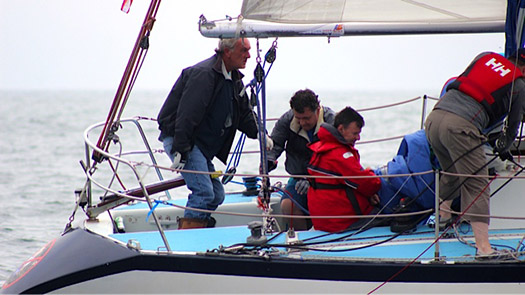
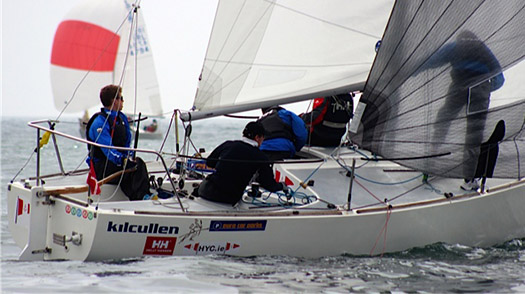
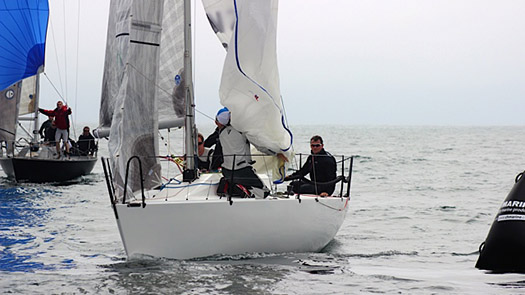
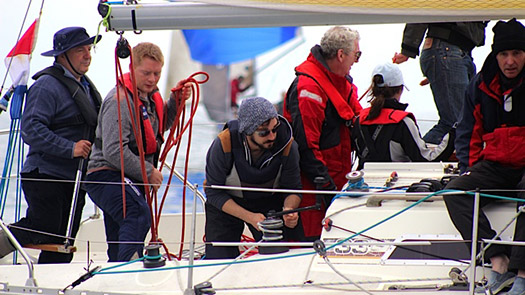
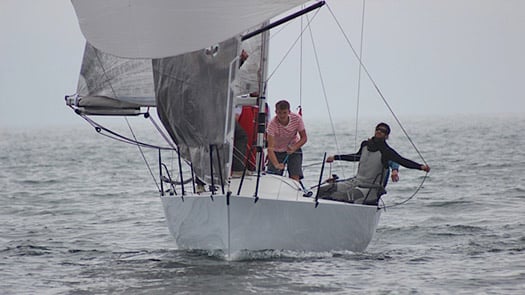
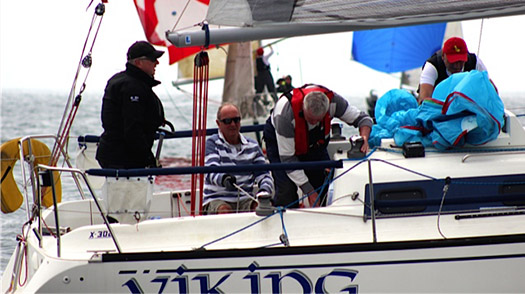
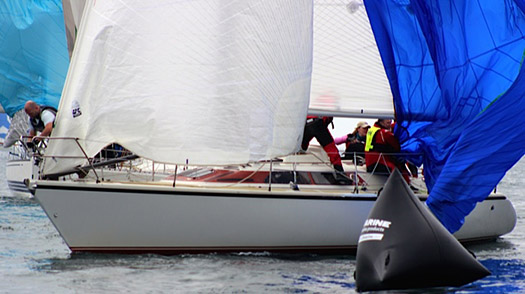
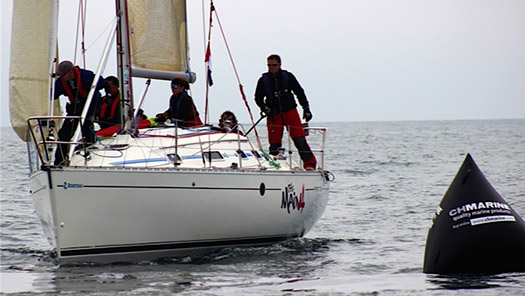
Dead Calm at Day Two of ICRA Sailing Champs on Dublin Bay
#cruiserracing – With racing abandoned for the bulk of classes there was frustration for the 113–boat ICRA championship on Dublin Bay today and an earlier start than scheduled for tomorrow's final day of competition.
Classes Zero and One completed their minimum amount of races for a championship after a short round the cans course in less than five knots of breeze but other classes are still looking for more racing tomorrow to complete the series.
In a frustrating day three race management teams afloat, what should have been a full programme was dominated by drifting in dead calm conditions for five hours at the Teng Tools ICRA National Championships today.
Classes Two, Three and Four were expecting three windward-leeward races and though Principal Race Officer Jack Roy managed to get the first group away in a gentle north-east airflow, a windshift to the east followed by a drop to a knot of "Force Nothing" wind saw the race abandoned. The other classes had also only just restarted after a recall in their sequence.
No further racing was possible as the fleet remained at sea until 3pm in the hope of an improvement in conditions. Racing was also abandoned on the Corinthian courses for White Sails entries.
On the 'Round the cans' course, Classes Zero and One managed to complete three legs of their first race before it was shortened by PRO Henry Leonard. The result enabled both classes to complete their minimum quota of three races to qualify for a championship series.
Class Zero was again dominated by Denise Phelan's Jump Juice from the Royal Cork Yacht Club. George Sisk's WOW! from the hosting Royal Irish YC has emerged as the principal challenger while Scottish entry Roxstar holds third overall.
Meanwhile, Class One has had a shake-up after the strong opening day by John Maybury's Joker 2 from the Royal Irish YC on Friday. However, a tenth today along with a race win for Paul O'Higgins Rockabill V leaves the two boats tied on points.
With a marginally better forecast for tomorrow with a possiblilty of clearer skies that may allow a sea breeze to develop, organisers announced that racing will begin one hour earlier than planned. Warning signals for all three courses will be at 0955 IST.
Full results are available here


























